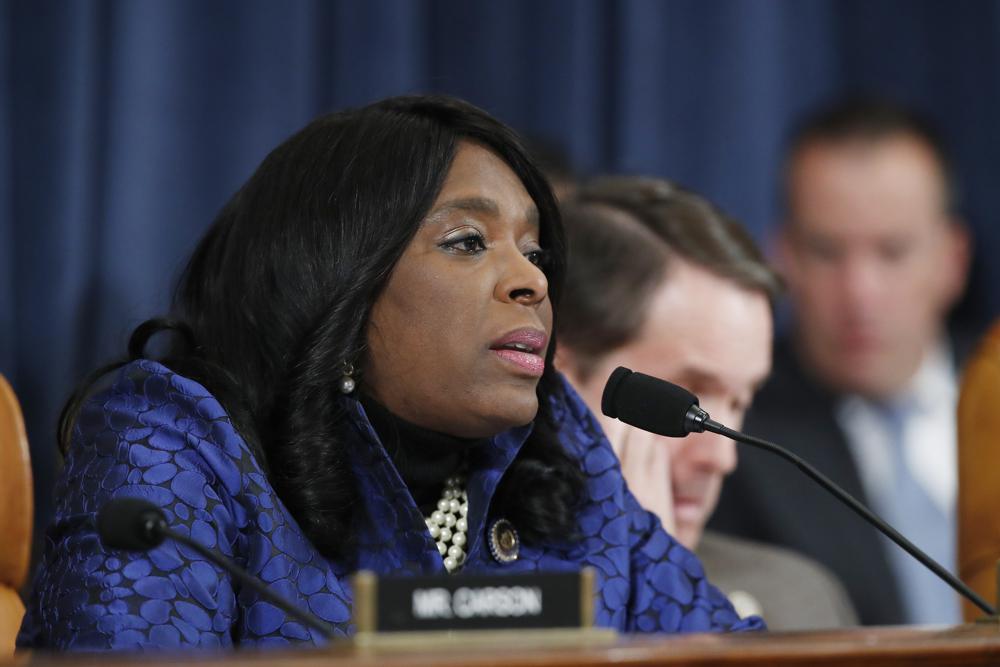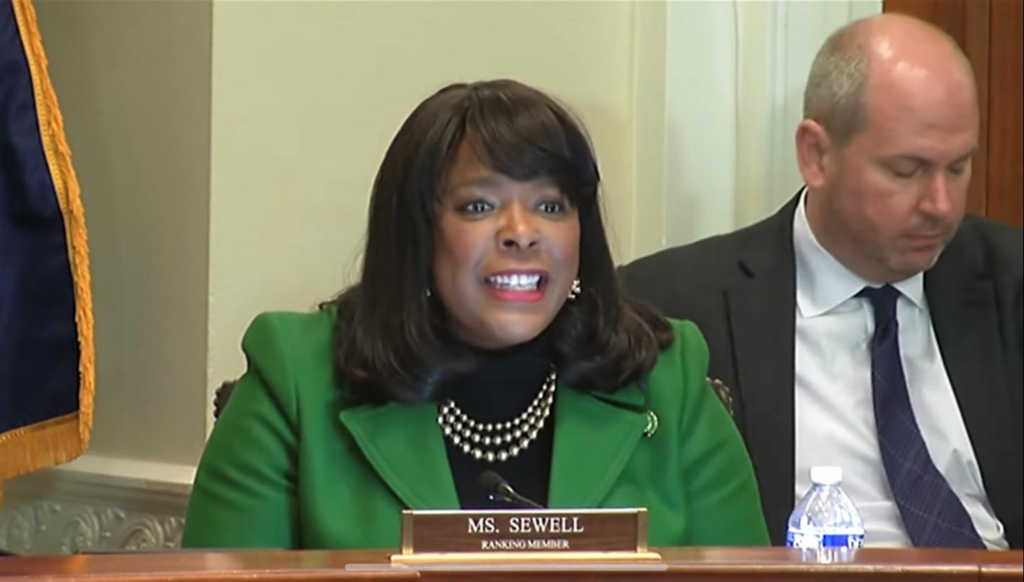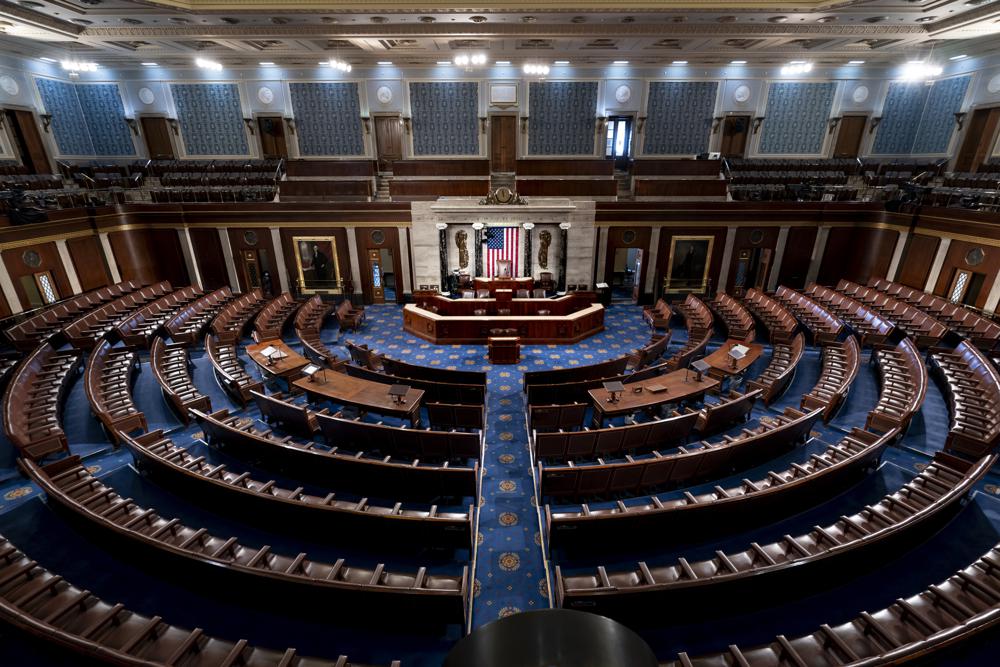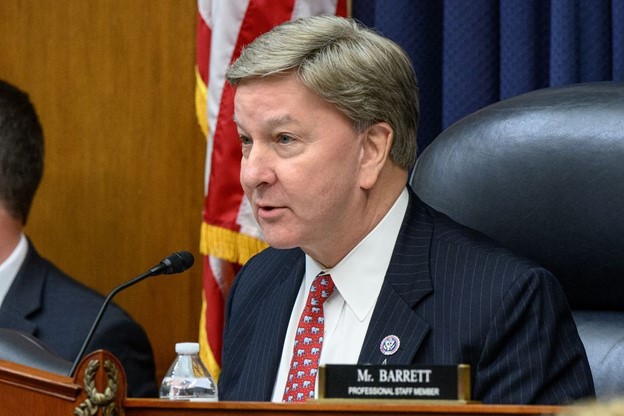Terri Sewell and Gus Bilirakis introduce bipartisan bill to help rare kidney disease patients

Terri Sewell and Gus Bilirakis introduced the New Era for Preventing End-Stage Kidney Disease Act. This legislation, they say, would help transform the delivery of care to rare kidney disease patients by increasing community and healthcare provider awareness and education. Medicare spends over $84 billion annually providing critical care to patients with chronic kidney disease. $36 billion of that is spent just on patients with end-stage kidney disease (ESKD). While there have been many medical advances in the last sixty years, there has been little innovation in treatment options for kidney disease patients since the 1960s, when kidney dialysis and immunosuppressants became commonplace. That may be changing. Earlier this year, the FDA approved the first-of-its-kind non-immunosuppressive drug therapy for the rare kidney disease IgA Nephropathy. Patients sometimes struggle to find a nephrologist well-versed in their rare conditions who can provide an accurate diagnosis and expert treatment. These treatment and diagnostic barriers, coupled with the lack of rare kidney disease awareness and education, often cause a delay in diagnosis that can result in a rapid decline in kidney function and, ultimately, kidney failure, leading to costly dialysis, kidney transplants where an organ can even be found, and too frequently – death. “Far too many people living with rare kidney disease have trouble finding specialized care providers,” said Sewell. “Increasing awareness and education is crucial to caring for rare kidney disease patients, which is why I’m so proud to introduce the New Era For Preventing End Stage Kidney Disease Act. This legislation will make critical improvements to the way patients with rare kidney disease, especially those in underserved communities, access and receive care.” “Our life-saving legislation will help remove diagnostic and treatment barriers for many patients suffering with a rare disease,” said Rep. Bilirakis. “Through the establishment of Rare Kidney Disease Research Centers of Excellence and increased provider education efforts, we will empower providers to identify better the signs and symptoms of rare kidney disease, which will lead to improved treatment options and better patient outcomes.” Joshua Tarnoff is the CEO of NephCure – a tax-exempt 501 (c)(3) charity whose mission is to empower people with rare, protein-spilling kidney disease to take charge of their health while leading the revolution in research, new treatments, and care. “NephCure commends Congressman Gus Bilirakis and Congresswoman Terri Sewell for championing the New Era of Preventing End-Stage Kidney Disease Act and efforts to see a future in which improved diagnoses, access to treatments, and patient empowerment converge to reshape the trajectory of rare kidney diseases,” said CEO Tarnoff. “This bill can change how we take care of rare kidney disease patients through earlier detection and access to the right treatments, providing rare kidney disease education opportunities to doctors and patients, and allocating money for research. We are proud of the essential contributions the rare kidney disease community played in the development and introduction of the New Era of Preventing End-Stage Kidney Disease Act. We are committed to continue working alongside Congressman Bilirakis and Congresswoman Sewell to pass this important legislation in the 118th Congress.” 92,000 Americans are currently on the National Transplant List waiting for a kidney. Diabetes is the leading cause of kidney failure. Hypertension is the second leading cause. According to the National Institute for Health (NIH), 808,000 Americans are living with end-stage kidney disease. An estimated 1 in 7 American adults have chronic kidney disease. 90% of them are unaware of it, and most won’t learn of it until it is advanced. 51,000 Americans die annually from kidney failure. To connect with the author of this story or to comment, email brandonmreporter@gmail.com
Today is Alabama Day

On December 14, 1819, Alabama became a state. While not an official state holiday, Alabama Governor Kay Ivey (R) did issue a proclamation declaring Thursday – Alabama Day. “For 204 years, our great state has stood as a testament to the enduring spirit of her people. I am honored to proclaim today as Alabama Day,” the Governor said on X. Congressman Barry Moore (R-AL02) also recognized the historical significance of Alabama Day on his X account. “On this day 204 years ago, Alabama became the 22nd state in our union. Happy National Alabama Day!” Moore wrote. Alabama Court of Criminal Appeals Judge Richard Minor also posted about the day and included maps of the first judicial districts in the then-new state. “204 years ago today Alabama gained statehood,” Judge Minor wrote on X. “Before that, she was a territory. And to think, judicially we started with only 5 judicial circuits, and the 5 circuit judges made up the Alabama Supreme Court. And each had life tenure.” “On this day in 1819, Alabama was admitted to the Union, becoming the 22nd state in the U.S.A. Wishing all of our citizens a Happy Alabama Day!” said the Alabama Republican Party on X. “Happy National Alabama Day!” On this day in 1819, Alabama became the 22nd state to join the union,” Congresswoman Terri Sewell (D-Selma) said on X. “Since then, the people of our state have played a pivotal role in shaping the history of our nation.” To connect with the author of this story or to comment, email brandonmreporter@gmail.com.
Reps. Terri Sewell and Robert Aderholt win friendly football wager with Georgia colleagues

On Saturday, the University of Alabama football team bested the University of Georgia in the Southeastern Conference Championship Game 27 to 24. The win means Alabama gets to add their 30th conference championship trophy to their trophy case and gets to play in the college football playoffs. Georgia, who had been the number one ranked team in the country going into the game, fell out of the top four and was eliminated from playoff competition. The win also means that Congress members Terri Sewell (D-AL07) and Robert Aderholt (D-AL04) were victorious in their wager on the game with Georgia Congress members Nikema Williams (D-GA) and Buddy Carter (R-GA). Reps. Williams and Carter made good on their friendly wager with Sewell and Aderholt on Wednesday, treating the Alabama Congressmembers to a Chick-fil-A lunch. The Crimson Tide’s victory ended Georgia’s 29-game winning streak and effectively ended Georgia’s effort to win its third college football national championship. Sewell wrote on Facebook, “Thanks to our Georgia colleagues for making good on our wager after Bama’s SEC win!! Congressman Aderholt and I can confirm—Victory really does taste better with a side of chicken!” Rep. Aderholt said on X, “Roll Tide! Congratulations to the Tide. And @RepBuddyCarter @RepNikema I know that @RepTerriSewell and I are looking forward to that Chick-fil-A!” Roll Tide! Congratulations to the Tide. And @RepBuddyCarter @RepNikema I know that @RepTerriSewell and I are looking forward to that Chick-fil-A! pic.twitter.com/M960t1OQT8 — Robert Aderholt (@Robert_Aderholt) December 3, 2023 Rep. Sewell may not be done with her sports wagers. “After Saturday’s big win, let’s see if we can find any Michigan colleagues brave enough to bet against the Tide,” added Sewell. Alabama, which is 12 and 1, next plays the University of Michigan in the first round of the College Football Playoffs on January 1. Michigan is 13 and 0, the Big 10 conference champion, and is the new number-one ranked team in the country. Alabama jumped from number 8 in the nation to number 4, while Georgia has fallen from number 1 to number 6 in the rankings. Florida State University won the Atlantic Coast Conference Championship Game Saturday, but the College Football Playoffs Committee dropped the 13 and 0 FSU team from its number 4 spot (and a place in the playoffs) to number 5. FSU will play Georgia in a New Year’s Day bowl game. To connect with the author of this story or to comment, email brandonmreporter@gmail.com.
Rep. Terri Sewell says 8th Circuit Court Voting Rights Act ruling is “deeply disturbing”

On Monday, Congresswoman Terri Sewell (D-AL07) called Monday’s ruling by the 8th U.S. Circuit Court of Appeals on Section 2 of the Voting Rights Act “deeply disturbing and wrong as a matter of law.” “This ruling by the 8th Circuit Court of Appeals is deeply disturbing and wrong as a matter of law,” Rep. Sewell said. “If allowed to stand, it would be the death knell of the Voting Rights Act, stripping individuals and civil rights groups of their ability to fight back against voter discrimination in court. The Supreme Court must reverse this disastrous ruling without delay. “I’m calling on Congress to immediately pass the John R. Lewis Voting Rights Advancement Act,” said Sewell. We cannot allow extremists to strip away the remaining protections of the VRA.” Critics argue that the John R. Lewis Voting Rights Act tramples on states’ rights and would give the federal government unprecedented control over how states conduct elections. The three-judge panel of the 8th Circuit ruled that the Voting Rights Act of 1965 does not allow private citizens or civil rights groups to sue the government over the Voting Rights Act. The panel for the United States Court of Appeals for the Eighth Circuit ruled Monday that only the U.S. Department of Justice can bring a civil rights complaint under the Voting Rights Act. The Arkansas State Conference of the NAACP and the Arkansas Public Policy Panel filed a lawsuit over House redistricting lines, saying they diluted the black vote. The federal district judge who heard the case, a Donald Trump appointee, dismissed the lawsuit in 2022, ruling that the plaintiffs did not have standing to bring the lawsuit. A lower court said only courts assumed in the past 50 years that private citizens or groups could bring a Voting Rights Act lawsuit. Two of the three judges on the panel agreed with the lower court. Arkansas Attorney General Tim Griffin called the ruling a “victory for our citizens and the rule of law.” “For far too long, courts across the country have allowed political activists to file meritless lawsuits seeking to seize control of how states conduct elections and redistricting,” Griffin said. “This decision confirms that enforcement of the Voting Rights Act should be handled by politically accountable officials and not by outside special interest groups.” In Alabama, private citizens and civil rights groups sued the state, arguing that the 2021 redistricting by the state legislature violated the Voting Rights Act because the Black minority in the state only got to choose one member of the state’s congressional delegation. A federal three-judge panel ruled that they were right and ordered redistricting by a court-appointed special master. Monday’s decision does not apply directly to Alabama because the state is in the 11th Circuit and not the 8th, but this will almost certainly be appealed to the Supreme Court, which likely will decide this issue for the whole country. To connect with the author of this story or to comment, email brandonmreporter@gmail.com.
Rep. Terri Sewell introduces bipartisan ARCH Act to help rural communities

Last week, U.S. Reps. Terri Sewell (AL-07) and Carol Miller (WV-01) introduced H.R. 6430, the Assistance for Rural Community Hospitals (ARCH) Act. This bill would provide greater financial stability for rural hospitals by extending the Medicare-dependent hospital program and Medicare low-volume hospital payments for five years each. The bill would also require a GAO report to ensure Medicare rural hospital designations are bolstering rural health care. Reps. Sewell and Miller previously introduced the ARCH Act in August of 2022. “We in Alabama have seen our rural hospitals come under immense strain, threatening to make it harder for our communities to access the services they need,” said Rep. Sewell, lead Democratic sponsor. “This legislation is about providing stability to our rural hospitals so that they can keep their doors open and continue serving patients. There is no time more befitting than National Rural Health Day to shine a spotlight on the needs of our rural hospitals. I thank Congresswoman Miller for her partnership and urge my colleagues to join us in supporting this legislation.” “Hospitals in rural communities should have access to the same resources as any other hospital to keep their doors open and administer efficient and quality care,” said Rep. Miller, lead Republican sponsor. “In the midst of rising healthcare prices and medical workforce shortages, the ARCH Act will provide Medicare-dependent and Medicare low-volume hospitals with much-needed financial stability. I was pleased to introduce this bill on National Rural Health Day and bring awareness to the concerns rural patients and hospitals are experiencing. I am grateful to Congresswoman Sewell for joining with me on this issue as we champion rural hospitals and provide them with the support they need to serve our communities.”
Terri Sewell votes for bipartisan plan to avoid government shutdown

On Tuesday, the U.S. House of Representatives voted in favor of a bipartisan plan to keep the government funded through January avoiding a government shutdown. New Speaker of the House Mike Johnson (R-Louisiana) was abandoned by the ultra-conservative Freedom Caucus so he was forced to negotiate with Democrats to craft the package to keep the government operating. Congresswoman Terri Sewell (D-AL07) voted with Speaker Johnson in favor of the Continuing Resolution (CR) to keep the federal government open and avoid the potentially disastrous consequences of a shutdown. The CR funds the federal government at current levels through January 19th for certain agencies and February 2nd for others. It passed the House of Representatives by an overwhelmingly bipartisan vote of 336 to 95 and will now make its way to the U.S. Senate. “We in Congress have a responsibility to the American people to keep the government open and protect the programs that families rely on,” said Rep. Sewell. “While I have some concerns about the staggered funding deadlines, this measure prevents a shutdown and protects against the extreme cuts pushed by my colleagues across the aisle. Families in Alabama can breathe a sigh of relief knowing that their Thanksgiving plans will not be affected by a government shutdown.” Sewell wrote on X, “Tonight, I voted for a bipartisan measure to keep the government open and protect the programs that Alabamians rely on. While I have concerns about the staggered funding deadlines, this measure prevents a shutdown and protects against extreme cuts pushed by my GOP colleagues.” Two Democrats and 93 Republicans voted in opposition to the bill. The bifurcated bill will extend funding at current levels until January 19 for programs and agencies for four appropriations bills: Military Construction and Veterans Affairs; Agriculture, Rural Development and Food and Drug Administration; Energy and Water Development; and Transportation, Housing and Urban Development. It extends funding for the remaining eight at current levels through February 2. It would also extend the authorization of programs and authorities in the Farm Bill until September 30 avoiding a showdown over farm programs and supplemental nutrition assistance programs for ten months. Congressman Barry Moore (R-AL02) voted against the legislation. “Our country is nearly $34 trillion in debt, and over 60% of American families are living paycheck-to-paycheck,” said Moore in a statement. “I voted against this continuing resolution because it contained no spending cuts and Americans cannot afford more of the status quo. I am committed to working with Speaker Johnson on the last five of twelve appropriations bills that contain significant cuts and a Farm Bill that prioritizes the needs of our producers.” The legislation now heads to the Senate, where it has support from both party leaders. Senate Majority Leader Chuck Schumer (D-New York) and Minority Leader Mitch McConnell (R-Kentucky). “We would like to do it as soon as possible,” Schumer told reporters. “Both McConnell and I want to avoid a shutdown, so getting this done obviously before Friday at midnight — we know the Senate has lots of arcane rules. But McConnell and I are going to work together, we talked about this yesterday, to get it done as quickly as possible.” To connect with the author of this story or to comment, email brandonmreporter@gmail.com.
U.S. House passes stopgap spending bill in bipartisan vote, in crucial test for new speaker

Jennifer Shutt, Alabama Reflector WASHINGTON — The U.S. House took a broadly bipartisan vote Tuesday to fund the government into the new year, though the measure must pass the Senate by the end of the week if Congress is going to avoid a partial government shutdown. The 336-95 House vote was the first major legislative test for Speaker Mike Johnson, the Louisiana Republican who took on the role after the former speaker was ousted after passing a similar bipartisan short-term funding bill in late September. A total of 93 House Republicans voted against the bill, but enough Democrats supported it to send the measure to the Senate. In the Alabama delegation, U.S. Reps. Robert Aderholt, R-Haleyville; Terri Sewell, D-Birmingham, and Dale Strong, R-Madison, voted for the bill. U.S. Reps. Jerry Carl, R-Mobile; Barry Moore, R-Enterprise; Gary Palmer, R-Hoover and Mike Rogers, R-Saks, voted against it. Senate Majority Leader Chuck Schumer, a New York Democrat, said Tuesday that he and Minority Leader Mitch McConnell, a Kentucky Republican, both agree the Senate needs to pass the bill quickly to avoid a funding lapse. “If the House should pass it, and I hope they do, Leader McConnell and I will figure out the best way to get this done quickly,” Schumer said. During a press conference prior to the vote, Johnson defended his decision to move the short-term spending bill, saying it would prevent Congress from passing an omnibus spending package in mid-December before the holiday break. Republicans have repeatedly said they oppose such massive packages, which wrap together all 12 government spending bills, often on short notice. He rejected criticism from fellow GOP lawmakers that he was making a mistake and taking the wrong approach to funding the government. “We’re not surrendering, we’re fighting. But you have to be wise about choosing the fights,” Johnson said. “You’ve got to fight fights that you can win, and we’re going to, and you’re going to see this House majority stand together on our principles.” Johnson said he was optimistic that Congress would be able to pass the dozen full-year appropriations bills before the new deadlines next year, avoiding the need for another stopgap spending bill. “Part of the reason I’m confident about this is, I’ve been drinking from Niagara Falls for the last three weeks. This will allow everybody to go home for a couple of days for Thanksgiving,” Johnson said. “Everybody can cool off.” During that time, Johnson said he would get a group together to “map out that plan to fight for” conservative principles in the final set of 12 spending bills. The current fiscal year ends on September 30, 2024. “I look forward to rolling that out,” he said. “You’ll see much more of that.” Two deadlines The 32-page short-term spending bill, sometimes called a continuing resolution or CR, would fund part of the federal government through January 19 and the remainder of the annual appropriations bills through February 2. The short-term funding measure is intended to give Congress and the White House more time to negotiate the dozen full-year spending bills. But there are several pitfalls along the way. Former GOP Speaker Kevin McCarthy was ousted from his leadership role after moving the short-term government funding bill in late September that will keep the federal government up and running through Friday. The decision by eight House Republicans and Democrats to vote to “vacate the chair” plunged the chamber into gridlock for weeks as GOP lawmakers debated who should lead the party. After nominating three Republicans who couldn’t get the votes on the floor to hold the gavel, the party finally coalesced behind Johnson. But some of the especially conservative members became frustrated this week with his decision to put the stopgap spending bill on the floor. The short-term spending bill would give the House and Senate until January 19 to work out an agreement on the Agriculture-FDA, Energy-Water, Military Construction-VA, and Transportation-HUD spending bills. The remaining eight spending bills — Commerce-Justice-Science, Defense, Financial Services, Homeland Security, Interior-Environment, Labor-HHS-Education, Legislative Branch, and State-Foreign Operations — would have funding until February 2. The House and Senate would need to reach an agreement well before those deadlines on the total amount of spending for the current fiscal year that began back on October 1. The leaders of the Appropriations committees would then determine how much of the money goes to each of the dozen bills. Democrats have said the total spending level should match what Congress and President Joe Biden agreed to in the debt limit law this summer. But some Republicans have pressed for lawmakers to go below that level. Lawmakers sound off on spending Idaho Republican Rep. Mike Simpson, chair of the Interior-Environment spending panel, said that leaders need to clarify the total spending number, though he expects that will ultimately match the debt limit law. “I think it will end up being that, but leadership needs to tell us,” Simpson said. Georgia Rep. Sanford Bishop Jr., the top Democrat on the Agriculture spending panel, said the total spending level for the final slate of bills that the House and Senate will negotiate in the coming weeks and months needs to adhere to the number in the debt limit law. “Some of them, particularly the MAGA Republicans, pretty much don’t agree with it. They want to cut much more drastically than is beneficial for the American people,” Bishop said. “The moderate, reasonable minds of that side think that we probably should do something that is reasonable.” Maryland Rep. Steny Hoyer, the top Democrat on the Financial Services spending panel, said a key challenge to getting full-year bills agreed to is that “Republicans have been unable for eight or nine months to get their act together on fiscal issues.” “And we’d lost a speaker over that,” Hoyer said. “They were unable to elect speakers for some period of time, and there is still no guarantee that we know what the overall spending levels are.” Ohio Democratic Rep. Marcy Kaptur, ranking member
Mike Rogers urges Senate to go to conference on the NDAA

On Friday. Congressman Mike Rogers (R-AL03) released a statement urging the Senate to go to conference on the FY24 National Defense Authorization Act (NDAA). Rogers is the Chairman of the House Armed Services Committee. “For the first time in two years, we have the opportunity to return to regular order and hold a conference to work out the differences between the House and Senate bills,” Chairman Rogers said. “Unfortunately, for over seven weeks, the Senate has refused to agree to a conference and name their conferees. It’s vital that Congress come together to enact an NDAA that will build the ready, capable, and lethal fighting force we need to defend our nation. The House is ready to get to work – I urge the Senate to join us.” Rogers explained that the NDAA is legislation that authorizes funding for the Department of Defense and ensures that Congress fulfills its constitutional duty to make sure that our warfighters have the training and equipment that they need. The Senate passed a largely bipartisan NDAA with no controversial political planks. The House Armed Services Committee did the same, and the NDAA passed out of committee with wide bipartisan support. However, once the NDAA got to the floor of the Republican-controlled U.S. House of Representatives, the Republican majority added a number of GOP priorities to the bipartisan version of the NDAA. One of these is a plank overturning President Joe Biden’s military abortion policy. Congresswoman Terri Sewell (D-AL07) voted against the NDAA due to the Republican changes on the floor. “I did not take this vote lightly,” Sewell said. “I have proudly voted in favor of the annual defense bill every year since coming to Congress. But I cannot and will not support a bill that would rip basic health care away from our service members and make bigotry and discrimination a centerpiece of our defense policy. Republicans need to stop playing politics with our national security.” If the NDAA goes to a conference committee, a bipartisan committee of Senators and Representatives will produce a compromise version of the NDAA. The Senate’s Democratic Party leadership does not want to go into conference committee with any of those Republican planks even being a negotiating point and has thus far resisted even going to conference on the differences between the two bills. Weeks that could have been spent on the NDAA and the budget were instead wasted in a mindless battle for power between squabbling Republican House members over which one of them was allowed to hold the Speaker’s gavel – two weeks were also wasted on this same pettiness back in January. The annual NDAA should have been passed and signed by the President by September 30. Mike Rogers represents Alabama’s Third Congressional District. To connect with the author of this story or to comment, email brandonmreporter@gmail.com.
Reps. Terri Sewell and Robert Aderholt support keeping Birmingham-Southern College open

Birmingham Southern College (BSC) is probably going to close after Alabama Treasurer Young Boozer made the determination that the college is a bad credit risk and, therefore, refused to give the small liberal arts private college a bridge loan to keep its doors open last month. Congressmembers Robert Aderholt (R-AL04) and Terri Sewell (D-AL07) penned a joint editorial with the Alabama Medical Group arguing that keeping the failing liberal arts college open is good for Birmingham. “Although we represent different districts and different political parties in the U.S. House of Representatives, there are times that we agree when it comes to what’s best for Alabama,” Aderholt and Sewell wrote. “This is one of those times.” BSC is in Sewell’s district where the loss of 284 jobs would be keenly felt; while Aderholt is an alum of the school – as is his wife, Caroline. “When it comes to what is best for Alabama, we agree that keeping this 167-year-old college open and helping it achieve financial stability makes the list,” Aderholt and Sewell wrote. “We were glad when the Alabama Legislature passed SB278, which established the Distressed Institutions of Higher Learning Revolving Loan Program. Because Alabama had a once-in-a-generation, $2.8B surplus in the Education Trust Fund, setting aside $30 million for the loan program was accomplished without reduction to state-supported institutions. This was and is a great use of a small fraction of that surplus, giving BSC the operating capital it needs while it raises private funds to restore its endowment to a level that will sustain the College going forward.” “Without BSC, young people who want what BSC offers – a small, residential, nationally ranked college in a big Alabama city – will have to go elsewhere. And once they leave, they may not return,” Aderholt and Sewell wrote. “Alabama residents make up 60 percent of BSC’s student body. Half of BSC’s 17,000 graduates remain in Alabama, where their impact is seen and felt in every walk of life in every one of our 67 counties. We strongly urge Treasurer Boozer to rethink his decision to deny the bridge loan that was designed for this very situation: To help out a college or university in Alabama that brings significant value to its community, has been in business for more than 50 years, has assets sufficient to back the state’s loan, and has a solid plan for paying it back.” On Friday, BSC President Daniel Coleman insisted that the College would have enough money to finish out the academic year meaning that current students do not need to transfer as there will be a spring semester. “On August 15, the Birmingham City Council passed a resolution that charged Mayor Randall Woodfin with creating an economic development plan of up to $5 million to support Birmingham-Southern College,” Coleman wrote. “Since then, we have continued to work with Mayor Woodfin, who will formally present his plan to the Council on November 21. We are grateful to him and to the Council for their consideration of this critically important support.” “These developments give us confidence that, at a minimum, we will complete the academic year, during which we will continue to procure funds that will stabilize the College for the long term,” Coleman insisted. “That includes working with the Alabama Legislature, private donors, and other entities. Students, you should register for spring 2024 classes and continue with your plans for the January E-Term.” Montgomery Circuit Judge James Anderson dismissed BSC’s lawsuit attempting to compel Boozer to give them the loan. BSC has been in a long decline and today has fewer than 750 students. To connect with the author of this story or to comment, email brandonmreporter@gmail.com.
Jared Norrell: Creating better access to health care should be top priority for Alabama lawmakers

As an advocate who is helping to foster and build the next generation of strong leaders in our state, it troubles me to see the ever-increasing cost of health care burdening families more and more each year. We must fix our complex, costly health system now, or it will be left to the next generation of young people. Without stronger solutions to repair the system and lower the cost of care for families, Alabamians will be surely hindered from reaching their full potential. We all want a stronger foundation for vibrant and successful communities in Alabama. This is the principal aim of Southern Preparatory Academy, where I serve as president. We are helping our future leaders succeed, grow, and learn how to serve others. But as we all saw very starkly during the COVID-19 pandemic, limited access to affordable health care quickly became an obstacle to growth for countless people in our state. Moving forward, creating better access to health care at an affordable cost should be a top priority for our Alabama lawmakers. When examining our healthcare industry, Alabamians consider access to care as one of their top health concerns, specifically in rural towns and for other populations that are disproportionately held back by a lack of healthcare providers. A lack of providers in certain areas often leads to increased out-of-pocket costs, as well as extra travel expenses and logistics. Alabamians are facing an increasingly fragile, complex, and expensive healthcare system that is becoming more financially overwhelming. Increased consolidation among large hospital systems is one trend that is driving patient prices even higher. There are several negative side effects of hospital consolidation that families and patients should be aware of – namely, a hike in medical costs due to new ownership of certain medical facilities through consolidation. When large hospitals buy up independent practices and small labs or treatment centers, they bump up the prices of regular appointments and treatments, even though the delivery of service itself has not changed. Understandably, patients are confused and frustrated when they see their bills go up unexpectedly after a doctor’s appointment. Alabamians of all ages and backgrounds need access to quality and affordable care options. Not only does our state have a high prevalence of multiple chronic conditions compared to the rest of the country, but our residents also have higher rates of obesity and premature deaths. We also know that our state has higher levels of income inequality. Put together, all these factors are worsening the chasm in public health as thousands of Alabamians cannot afford the quality health care they need. Lack of transparency in hospital billing only intensifies the public health battles we are already grappling with in our state. I am glad to see that there is a solution to address unfair hospital billing in Congress. The Facilitating Accountability in Reimbursements Act (FAIR) in the House and the Site-based Invoicing and Transparency Enhancement Act (SITE) in the Senate would implement fair billing practices that reflect the service received – not the location or ownership of the facility. Remarkably, fair billing policies – which can lead to site-neutral payment reforms like those in the SITE Act – are projected to reduce national health expenditures by as much as $672 billion. It is up to our leaders like Representative Terri Sewell and her fellow Alabama Representatives in Washington to propel the FAIR Act forward in the House, and for Senators Katie Britt and Tommy Tuberville to follow suit with the SITE Act. I am a fervent believer in investing in the next generation to build a stronger, more secure future in our state and across the country. This effort needs the support of collective voices – educators, students, veterans, patients, healthcare professionals, and more. Affording health care is imperative for all of us. We must ensure people can utilize our healthcare system to take care of themselves and their families now and in the future. Solutions today to improve our healthcare system are critically important for tomorrow’s success. Jared Norrell is a retired Lt. Colonel from the United States Army and the former President of Southern Preparatory Military Academy in Camp Hill, Alabama.
Terri Sewell votes against Republican Israeli supplemental aid bill

On Thursday, the U.S. House of Representatives passed a stand-alone supplemental appropriation to provide emergency military aid to Israel in its war against Hamas. Congresswoman Terri Sewell (D-AL07) voted against the Republican-led package and then released a statement to explain her opposition to the Republicans’ supplemental funding package. “While I fully support assistance to Israel, the partisan bill that House Republicans pushed through provides no assistance to Ukraine, blocks humanitarian aid to civilians in Gaza, and includes billions in tax giveaways to the rich,” Rep. Sewell said. “I am disappointed that my Republican colleagues have taken an otherwise bipartisan priority—supporting our national security and our allies—and turned it into a bitter partisan battle. This bill is dead on arrival in the Senate and undercuts the bipartisan efforts by the White House and the Senate to pass a comprehensive aid package that includes funding for both Israel and Ukraine and provides humanitarian aid to civilians in Gaza. I look forward to supporting this legislation, which is in line with President [Joe] Biden’s original funding request that would holistically support our national security efforts.” Twelve Democratic members of the House voted in favor of the legislation. The six Alabama Republicans all voted in favor of the measure. President Biden had asked for over $100 billion in a supplemental aid package, with $61 billion going to further Ukraine’s war with Russia. Republicans also objected to sending $6 billion in aid to Hamas-controlled Gaza, arguing that Hamas will simply seize the aid and use it to support their fighters. Democrats also objected to House Republicans using the supplemental appropriation to cut billions that Democrats passed when they still controlled the House of Representatives to hire 81,000 more IRS agents to harass and persecute American taxpayers. President Biden said he will veto the stand-alone aid bill for Israel. On October 7, Hamas fighters came across the Israeli border and killed 1,400 Israelis, including 32 Americans. Another 2,800 were wounded in the senseless attacks, and over 200 Israelis were taken hostage. Thousands of rockets were fired into Israel from both Gaza and Hezbollah-controlled regions of Lebanon. Israel has declared war on Hamas and has begun ground operations in Gaza while the Israeli air force continues to bomb targets in Gaza. Palestinian authorities claim that over 4,000 Palestinians have died in the fighting – most of them civilians. A bipartisan majority of Congress supports aiding the Israeli war effort, but they are not in agreement on how to do that. A key sticking point has been Biden’s insistence that aid for Israel is linked to aid for Ukraine. Terri Sewell is in her seventh term representing Alabama’s Seventh Congressional District. To connect with the author of this story or to comment, email brandonmreporter@gmail.com.
Robin Litaker qualifies in Congressional District Seven

On Tuesday, retired schoolteacher Robin Litaker qualified as a Republican to run for Congress in Alabama’s Seventh Congressional District. Litaker is challenging incumbent Congresswoman Terri Sewell (D-AL07) in the general election. Alabama Today spoke with Litaker about her campaign. When asked why she was running for Congress, Litaker said, “There are tons of reasons. Our country is in desperate need for conservative leadership.” “We have been traveling across the Black Belt as well as Birmingham even before the redistricting lines were redrawn, and there are so many needs,” Litaker said. “There are areas with no running water. There are areas with no sewage service.” “The Blackbelt has the richest soil in the world, but it is one of the most impoverished regions, not just in the state, but in our country.” The incumbent. Rep. Sewell is in her seventh term representing the Seventh Congressional District, but Litaker believes she can do a better job than Sewell. “The further away you get from an area, the less responsive to that community you become,” Litaker said. “Take Selma for example it is disintegrating with all of the population loss.” “We see a lot of her during election time, but in my travels, I have met with people all over the district who have never seen her,” Litaker added. Republicans like to say that the budget needs to be balanced but usually provide no specifics. When asked what she would cut from the federal budget, Litaker said, “Well, we have got a lot of problems.” Litaker said that a lot of the issue is the bureaucratic agencies have become “bloated.” Litaker gave the Department of Education as an example. “I do believe in school choice, but a poor in Choctaw County has to have a public education,” Litaker stated. “The federal Department of Education is so bloated with administrative costs that none of the money is getting down to the child. As a teacher, you are dictated to from the Department of Education. Even when you get federal money, they dictate what you can do with it. Whatever we are doing, obviously, it ain’t worked.” Litaker said that she favored abolishing the federal Department of Education. “Every agency can be trimmed,” Litaker continued. “The spending, it is out of control, and the salaries that the upper people get are outrageous.” “Every citizen has to balance their checkbook,” Litaker added. “If you spend and borrow more money than you can pay back, there would be repercussions. When Congress spends more than we have, there should also be repercussions.” When asked if she supported aiding Ukraine in its current war with Russia, Litaker stated, “No, what I don’t endorse is spending billions in unaccountable dollars. We have issues here. We are being invaded on our southern border, and I haven’t heard anything from the current district seven representative about it.” There is a lot of rural land mass in CD7. Alabama Today asked Litaker if she was confident that she could effectively represent Alabama farmers in the Congress. “Oh yes. I have talked to some farmers in my travels, and they want a voice,” Litaker said. “They need an advocate. The Blackbelt is one of the richest land areas in the world, but underutilized.” Litaker said that she supports legislation preventing foreign nationals from buying American farmland, but she would go further than that and take back the land owned by foreign nationals if their government does something hostile towards the U.S. “We need to put more in place to protect the farmers,” Litaker said. “I have got some ideas I have been working on. They need our support.” At present, Litaker does not have a Republican primary opponent. No Democrat has formally qualified to run against Sewell. The election is still 13 months away. To connect with the author of this story or to comment, email brandonmreporter@gmail.com.


